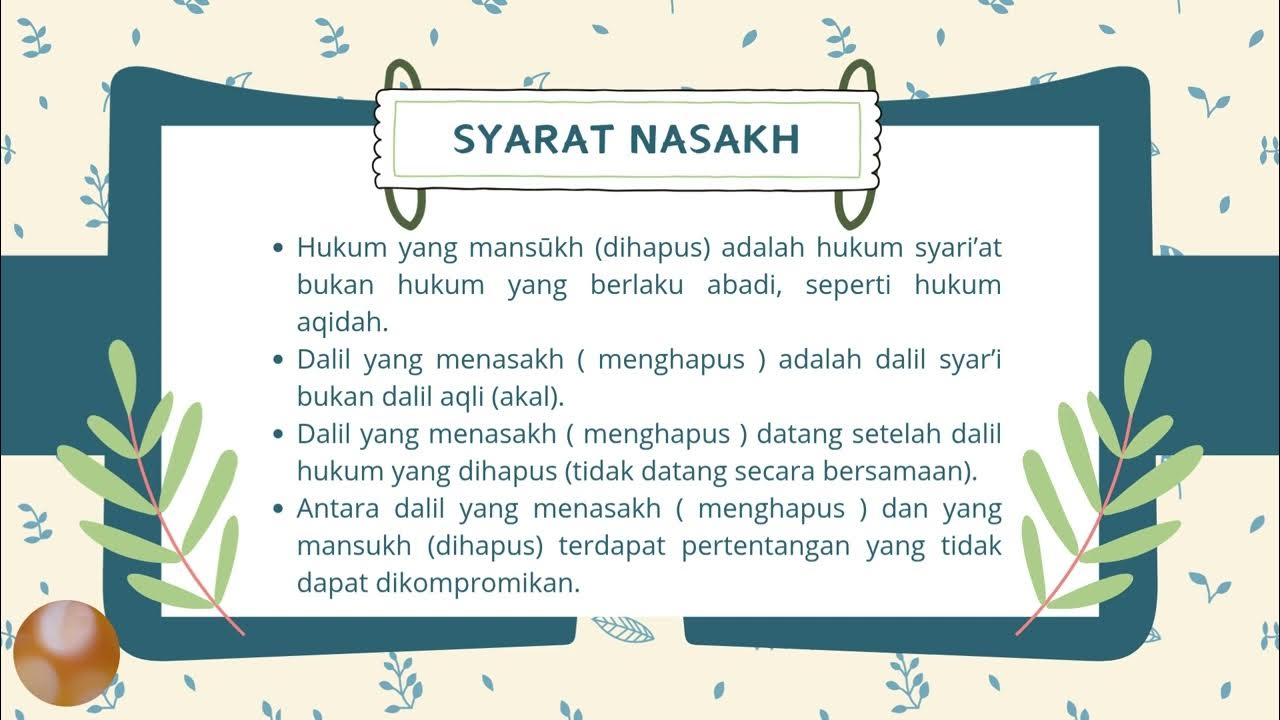Nasakh Mansukh | ust Dr Okrisal Eka Putra, Lc, M, Ag
Summary
TLDRIn this religious lecture, the speaker explores the concept of 'Nasakh' or abrogation in the Quran, addressing how certain verses may be superseded by later revelations. The speaker explains that this process reflects God's ultimate wisdom and is meant to provide more applicable laws and guidance for Muslims. Examples from the Quran are used to illustrate this concept, such as the shift in rulings on fighting during sacred months and the alteration of laws regarding fasting, inheritance, and prayer direction. The speaker emphasizes the importance of understanding these changes in the context of Islamic jurisprudence and divine wisdom.
Takeaways
- 😀 **Nasikh and Mansukh** are key concepts in Islamic jurisprudence referring to the abrogation or cancellation of certain Quranic rulings over time.
- 😀 **Nasikh (Abrogation)** refers to a verse or ruling in the Quran being replaced by a later verse, part of Allah’s divine wisdom.
- 😀 **Mansukh (Annulment)** involves the repeal of an existing law or ruling, replaced by a new guidance from Allah.
- 😀 Some people misunderstand **Nasikh and Mansukh** as inconsistencies in the Quran, but they are a reflection of divine wisdom for the benefit of the Muslim community.
- 😀 Allah’s decisions in **Nasikh** are for the betterment of the Ummah, ensuring that the laws evolve to meet the community’s needs.
- 😀 One example of **Nasikh** is the prohibition of fighting in sacred months, which was abrogated in Surah At-Tawbah, allowing defensive fighting during those months.
- 😀 Another example is the ruling on fasting during Ramadan, where **Fidya** (compensation) was misunderstood by some early Muslims but later clarified.
- 😀 The Islamic law of inheritance superseded the early permission to bequeath wealth to distant relatives, emphasizing fixed shares for family members.
- 😀 Changes in practices, such as the direction of prayer, demonstrate **Nasikh**. The original rule to face Jerusalem was abrogated to face the Kaaba in Mecca.
- 😀 Tools like GPS and map apps help Muslims face the correct direction for prayer, as the abrogated ruling no longer applies in the same way.
- 😀 Understanding **Nasikh and Mansukh** helps clarify the Quran’s teachings and fosters a deeper connection to Islamic law and the Quran itself.
Q & A
What is the main topic discussed in the script?
-The main topic discussed is 'Nasikh' (abrogation) in Islamic jurisprudence, specifically how certain Quranic rulings or laws were replaced or modified by subsequent revelations.
What does the term 'Nasikh' mean in the context of the Quran?
-'Nasikh' refers to the concept of abrogation, where a later Quranic verse or ruling replaces or modifies a previous one, often to serve the changing needs of the community.
How does the speaker explain the role of 'Nasikh' in Islamic law?
-The speaker explains that 'Nasikh' is a way through which Allah, in His wisdom, changes or updates rulings to better suit the circumstances of the time, ensuring the law remains relevant and beneficial for society.
What example does the speaker give regarding the prohibition of fighting during the 'haram months'?
-The speaker mentions that initially, the Quran prohibited fighting during the sacred months, but this was later abrogated by Surah At-Tawbah (9:36), which allowed fighting for self-defense during these months if the enemy initiated hostilities.
What misunderstanding does the speaker highlight regarding fasting for the elderly or sick?
-The speaker points out that there was a misunderstanding among some companions who believed that paying a penalty (Fidyah) was a sufficient replacement for fasting for the elderly or sick, but this was later corrected by a ruling that required fasting if one was able.
What is the significance of abrogation in the context of inheritance and bequests?
-In the case of inheritance, the speaker explains that earlier rulings allowed for bequests to children, but these were abrogated because the Quran had already established fixed shares for heirs, and bequests should only apply to non-heirs.
How does the speaker describe the change in the direction of prayer (Qibla)?
-The speaker describes how initially, Muslims were allowed to pray in any direction, but later, the ruling was abrogated by the verse in Surah Al-Baqarah (2:144) that mandated praying towards Masjid al-Haram in Mecca.
What was the impact of these abrogations on the understanding of Islamic law?
-The abrogations helped to refine and clarify the application of Islamic law, ensuring it was more consistent and applicable to the evolving needs of the Muslim community.
What is the key takeaway regarding the wisdom behind 'Nasikh'?
-The key takeaway is that 'Nasikh' demonstrates Allah's wisdom in making legal adjustments for the benefit of society, ensuring that the law is both just and adaptable to new circumstances.
What does the speaker hope to achieve by discussing the concept of 'Nasikh'?
-The speaker hopes to deepen the understanding of 'Nasikh' among the listeners, enhancing their appreciation for the dynamic nature of Islamic law and its relevance over time.
Outlines

このセクションは有料ユーザー限定です。 アクセスするには、アップグレードをお願いします。
今すぐアップグレードMindmap

このセクションは有料ユーザー限定です。 アクセスするには、アップグレードをお願いします。
今すぐアップグレードKeywords

このセクションは有料ユーザー限定です。 アクセスするには、アップグレードをお願いします。
今すぐアップグレードHighlights

このセクションは有料ユーザー限定です。 アクセスするには、アップグレードをお願いします。
今すぐアップグレードTranscripts

このセクションは有料ユーザー限定です。 アクセスするには、アップグレードをお願いします。
今すぐアップグレード5.0 / 5 (0 votes)






